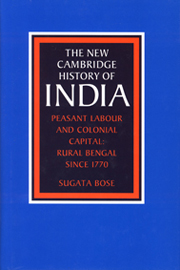Conclusion
from 5 - Resistance and consciousness
Published online by Cambridge University Press: 28 March 2008
Summary
An integrated analysis of the themes of demography, commercialization and agrarian social structure makes possible an assessment of their role as determinants of the direction and nature of socio-economic change over the long term in colonial and post-colonial Bengal. Some of the conclusions to emerge have broader theoretical and comparative relevance.
Dramatic changes in the river system of rural Bengal should modify the belief of historians of the longue durée that geographical structures represent constants in historical time. While the Bengal delta may well have been prone to extraordinary ecological turbulence, recent research is making clear that colonial India as a whole was subjected to substantial environmental change in the nineteenth century largely as a result of human agency in the form of state interventions. Demographic trends set broad parameters within which rural production occurred, but showed no concordance with output after the mid nineteenth century. Even in the early phase it is important not to elevate correlations to the status of causal relationships. From the 1820s fluctuations in the wider economic systems cast a stronger influence on the regional agrarian economy than movements of population. Changes in prices and the availability of credit flowing from supra-regional economic systems based on capitalism had a significant bearing on even the subsistence concerns of peasant labour. Peasants who had resorted to cash-cropping were especially vulnerable to downturns and periodic crises in the world economy. Population increase generally provided a positive impulse to innovation in agricultural techniques but was blocked or aborted by social and political obstacles embedded in the complex layers of property and possessory rights to the land which underpinned the agrarian power structure.
- Type
- Chapter
- Information
- Peasant Labour and Colonial CapitalRural Bengal since 1770, pp. 181 - 185Publisher: Cambridge University PressPrint publication year: 1993



